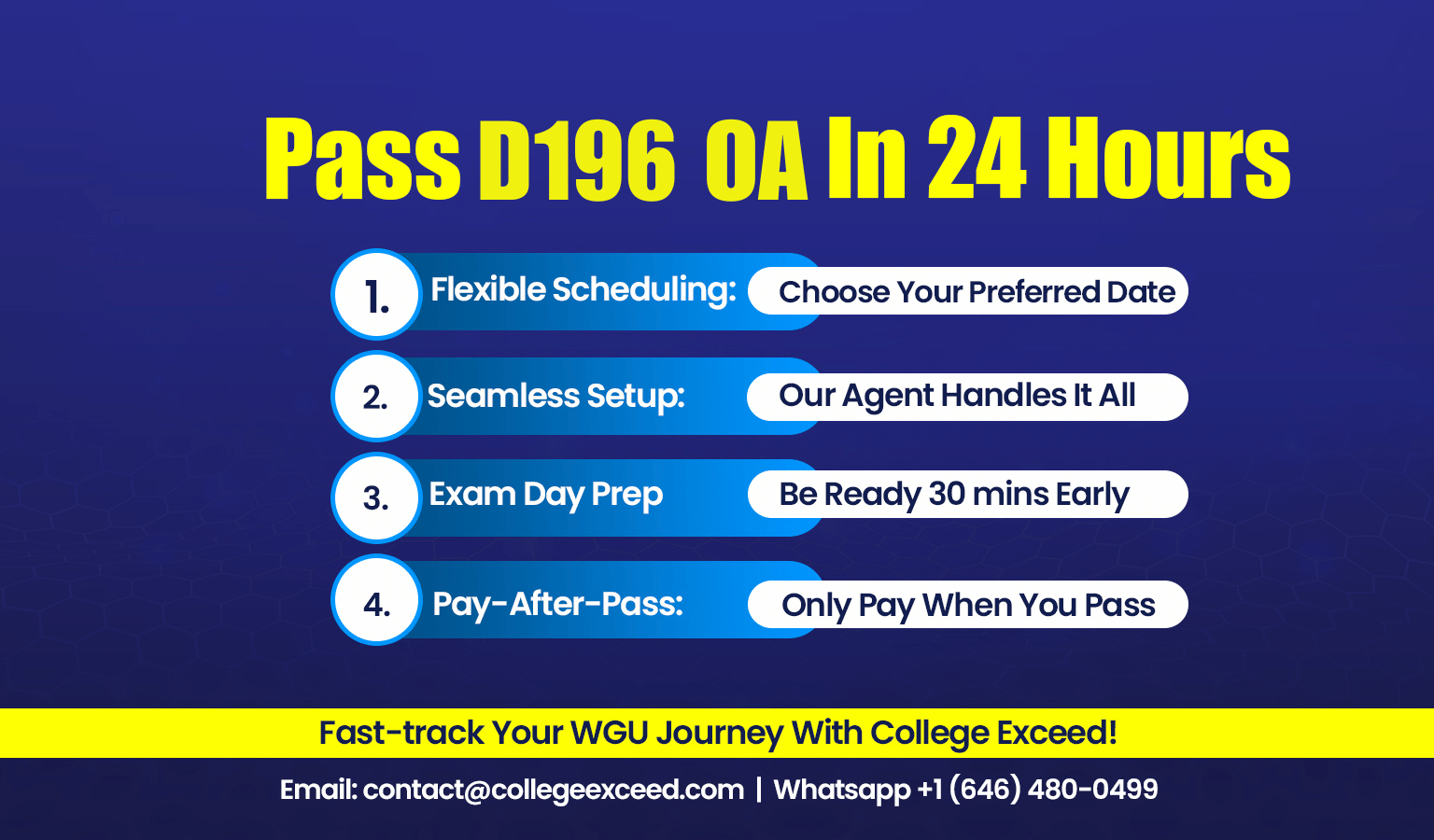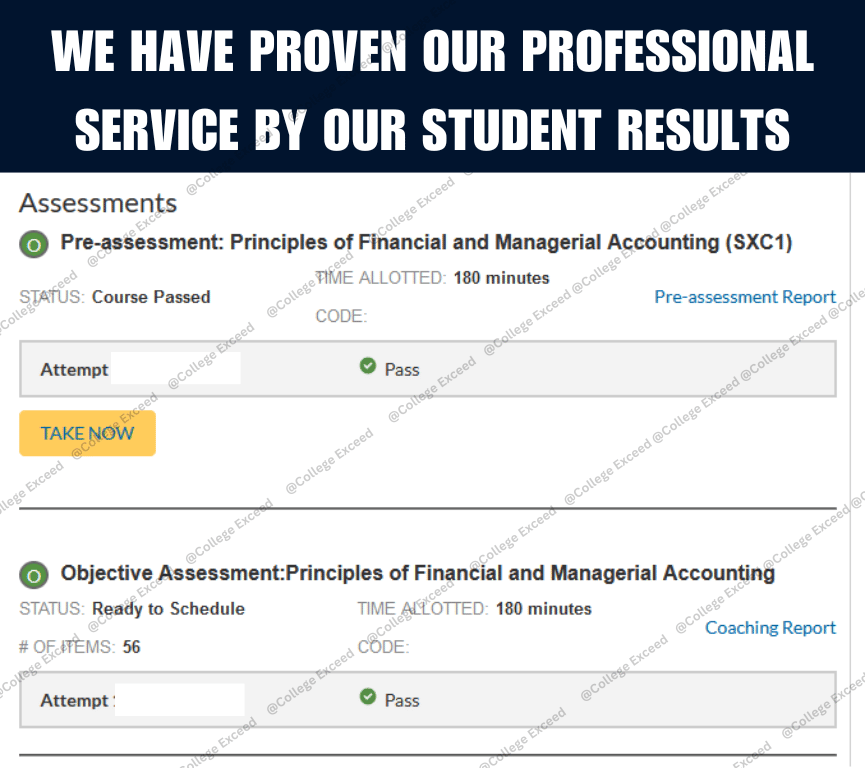Welcome WGU Night Owls, to our blog article on mastering the Principles of Financial and Managerial Accounting WGU D196 ! This module might seem daunting as it is regarded as one of the more challenging courses WGU has to offer. With its extensive content, figuring out how to study effectively can be overwhelming. But don’t worry, we’re here to help. In this article, we’ll simplify your study process by providing all the essential information you need to know about the module and offering a comprehensive study guide.
This guide will provide you with the following information;
- About the course content
- Study guide to navigate module D196
- Tips and tricks to prepare for the OA
- External resources to study
- FAQ
With our guidance, you’ll be well-prepared to tackle this course and achieve success. Good luck, and happy studying!
...
About the WGU D196 Course Content📖
Welcome to your Western Governors University course on Principles of Financial and Managerial Accounting WGU D196! This course provides students with an introduction to the discipline of accounting and its essential role within the business environment. Throughout this module, you will learn to differentiate between financial, cost, and managerial accounting, and understand how these various types of accounting fit into the broader business context.
In this course, you can expect to gain a solid foundation in key accounting concepts, including the budgeting process and basic financial statement analysis. You will also learn to use spreadsheets effectively for data analysis. This course serves as a comprehensive overview of the field of accounting, offering insights into how accounting information is used to make better business decisions. While it provides a business generalist perspective, it also acts as a preview for those considering an accounting major.
The following Units will be covered in this module:
Unit 1: Introduction
Unit 2: The Role and Purpose of Accounting
Unit 3: Financial Statements
Unit 4: Budgeting Cash Flows
Unit 5: Controlling Costs and Profits
Unit 6: Managerial Accounting
Unit 7: Costing Methodologies
As you embark on this learning journey, remember that the course is designed to make you a more informed decision-maker by using numerical information strategically. What is essential is that there is no necessity for one to be a math whiz; simple addition, subtraction, division, multiplication, and fractions will do. Quite simply, the primary objective is to gain a grasp of how accounting information can be utilized to facilitate effective organizational decision-making. However, in case you are still interested in accounting but would like to get more details, there are more enhanced courses that enable persons to get a technical view of the practice. However, let us concentrate on how these principles of accounting work in the business world to improve decision-making tools.
Study Guide to Navigate Module WGU D196 📝
In this section of the article, you can find our step-by-step guide on how to best prepare for the Principles of Financial and Managerial Accounting WGU D196 OA. This guide is developed by conducting our own comprehensive research into the course material as well as taking feedback from former course takers of WGU. By following our study guide, you will be able to learn the course content with ease and get confident with the knowledge in no time. It is important that you go through this guide at your own pace. Remember.. it is not a race to pass the module, your main focus should be to acquire new knowledge.
Step 1 – Install Excel and MyEducator
In module D196, we will be using the application Microsoft Excel for learning the course content. So our initial step into this module begins with installing the Excel application on your device. The TextBook provided by WGU for this module will provide you with a link to download the application provided for WGU students. Download this executable file and follow the instructions in the video link provided below.
How to install Excel in Windows OS – Link
How to install Excell in MAC OS – Link
Once you successfully install the Excel application, you will have to install an additional Add-On to Excel called “MyEducator”. To guide you through the installation steps for this Add-On, follow the instructions given in the TextBook. You can find the TextBook by going to the “Course Materials” section of the module.
Step 2 – Go through the Textbook
Now that you are equipped with Microsoft Excel, we will start going through the course content of D196. The first study resource we will utilize for this purpose is the WGU-provided Textbook, which you can find by following the below instructions.
- Log onto the Student Portal of WGU > Go to the module Principles of Financial and Managerial Accounting WGU D196 > Click on “Go to course materials”
The Textbook will provide you with a number of materials that will help you grasp the knowledge required to pass the final assessment. Make sure to go through all the pages of the TExtbook and follow each and every instruction to learn everything the Textbook has to offer. In the Textbook, you will also come across video instructions, showcasing how to use the knowledge you gained in the Excel application. Make sure to watch these videos and follow the instructions by yourself in your Excel workbook.
Another important aspect of the Textbook is that it contains a number of learning checks, module quizzes, and unit tests. These will help you retain the knowledge you gain in each unit and help you evaluate your memory. So attempt each and every quiz you come across in your studies.
Step 3 – Watch the video lectures and the recorded cohorts
Once you complete the Textbook, we will go through the course content through a different medium; the video lectures. If you are more of a visual learner than a reader, this will help you grasp the knowledge better than reading through the Textbook. Even though you might have completed the Textbook with no issues, watching the video lectures will ensure that you understand the key concepts without any doubts or gaps in your knowledge. As these lectures are conducted by the course instructors of D196, you will get a chance to receive advice on how to study the course material as well as how to attempt the OA. The instructors teach the course content focused on the OA, so you will get to know which units are significant when it comes to the final assessment.
To find the video lectures, navigate as mentioned below;
- Log onto the Student Portal of WGU > Go to the module Principles of Financial and Managerial Accounting WGU D196 > Go to “Course search” > Click on “D196 Recorded Cohorts and Resources”
After you go through the Unit-specific video lectures, take your time to go through the recorded cohorts that you can find in the same location. The cohorts will allow you to dive deeper into the core concepts and clarify any doubts you might have.
Step 4 – Watch the exam readiness video
Now that you have completed both the Textbook and the video lectures, it is time to prepare yourself for the challenge ahead. Even though now you are equipped with the knowledge of D196, you still need to evaluate your memory and verify that you are ready to sit for the OA. As the first step of preparing for the OA, we will go through the recorded video on how to prepare yourself for the OA named “Countdown to the OA. Are You Ready?”. This video will let you know all the information that you need to know about how to face the OA and what tips and tricks to use.. To find this video, navigate as mentioned below;
- Log onto the Student Portal of WGU > Go to the module Principles of Financial and Managerial Accounting WGU D196 > Go to “Course search” > Click on “D196: Principles of Financial & Managerial Accounting Course Resources” > Find the link to the video “Countdown to the OA. Are You Ready?”
Step 5 – Go through the Pre-A
In this step, we will utilize the Pre-A to evaluate your memory and understand the depth of your knowledge on module D196. Even though this is a mock assessment, treat it as the real OA to get an accurate estimate of your knowledge. Try your best to replicate the same environment as you would have in a real exam and go through the Pre-A.
Once you complete the Pre-A, a coaching guide will be auto-generated based on your performance. You will be able to find this coaching guide at the bottom of the module page instead of the usual location as in other modules. Once you locate the coaching guide, open the document and go through it to understand your weak points. This coaching guide will help you pinpoint the areas where you need to work on to have a better score in your future attempts. So go through these recommendations and refresh your knowledge in these areas by revisiting the Textbook and the video lectures.
If you failed the Pre-A in your first attempt, retake the Pre-A and try to achieve a score above 80%. Repeat this step until you successfully pass the Pre-A.
Step 6 – Attempt the OA
Congratulations on your success so far.. Now that you have arrived at the end of your journey, all you need to do is pass the OA of Principles of Financial and Managerial Accounting WGU D196. You have already proven that you are competent enough to pass the OA in your first attempt by aceing the Pre-A. So without hesitation, schedule the OA at a time of your convenience and give it your best.
...
Tips and Tricks to Prepare for the OA📖
Preparing for the Objective Assessment (OA) in Principles of Financial and Managerial Accounting (WGU D196) requires strategic study and familiarity with the course material. Here are some essential tips and tricks to help you succeed:
- Understand the Exam Structure:
Number of Questions : 56
Time Limit : 180 minutes
Passing Score : 70%
Question Types : Multiple Choice Questions (MCQ), Performance-Based Questions (PBQ)
Venue : Online proctored
- Align with the Pre-Assessment:
The Pre-Assessment closely mirrors the Objective Assessment. Use it to gauge your understanding and identify areas needing improvement. Practice thoroughly with the Pre-Assessment, as the questions on the OA are similar but with different numbers.
- Master Excel Skills:
– Formulas: Be proficient with Excel formulas, especially those related to contribution margins, ratios, and other financial metrics.
– Chart Creation: Know how to create and interpret column charts.
– Data Analysis: Practice analyzing data using spreadsheets.
– Memorize Key Formulas and Concepts:
– CVP Formula: Commit the Cost-Volume-Profit (CVP) formula to memory.
– Costing Methodologies: Understand various costing methods thoroughly.
– Accounting Terminology: Be familiar with key terms such as asset, liability, owner’s equity, and the distinctions between financial and managerial accounting.
- Focus on Core Topics:
– Financial Statements: Know where different activities are recorded in the balance sheet and the statement of cash flows.
– Budgeting and Cost Control: Understand budgeting processes, cash flows, and cost control mechanisms.
– Accounting Equation: Grasp how to apply the accounting equation and its impact on financial statements.
- Practice and Review:
– Vocabulary: The initial part of the course is heavy on vocabulary and top-level concepts. Review these terms regularly.
– Sample Questions: Practice with sample questions to become familiar with the format and style of the OA.
– Formulas and Calculations: While the math component is minimal, knowing the necessary formulas will make solving any calculation-based questions straightforward.
By following these tips and leveraging the Pre-Assessment, you will be well-prepared for the Objective Assessment. Good luck, and happy studying!
...
...
FAQ❓
Q1 . Which units should I focus on for the OA?
Units 2, 3, 6, and 7 are crucial as they make up 80% of the test content, so prioritize these areas in your studies.
Q2. How should I prepare for the Excel portion of the test?
Familiarize yourself with Excel formulas, creating and interpreting column charts, and analyzing data using spreadsheets, as these skills are essential for the OA.
Q3. What should I do if I struggle with Excel?
If you find Excel challenging, focus on practicing the specific skills required for the course. Use online tutorials to strengthen your understanding of Excel functions, formulas, and data visualization techniques. Completing the Excel exercises in the course material will also build your proficiency.
Q4. How important is time management during the OA?
Time management is crucial during the OA. Allocate your time wisely, ensuring you have enough time to answer all questions. If you find a question particularly challenging, move on and return to it later to avoid getting stuck.
Q5. What should I do if I need extra help with the course content?
Utilize WGU’s online resources, including videos, webinars, and interactive modules, and reach out to your course mentors for additional support.
...
Conclusion 📄
In conclusion, we encourage you to take the advice provided in this article to enhance your study approach for the Principles of Financial and Managerial Accounting WGU D196 module. Use the comprehensive study guide we’ve provided to navigate through the course material efficiently and prepare for the Objective Assessment. Focus on the key topics we highlighted, and make sure to utilize the tips and tricks shared to optimize your preparation. By following these strategies and dedicating consistent effort, you will be well-equipped to pass the Objective Assessment with confidence. Remember, mastering these accounting principles will not only help you succeed in this course but also enhance your overall business acumen. Good luck, and happy studying!







